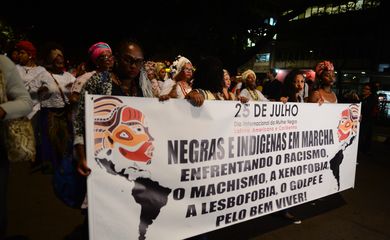Black women report to OAS increased violence against them


Black women chose the Organization of American States (OAS) to report the escalation of violence against them

Black women who suffered violence have chosen the Organization of American States (OAS) to report the escalation of violence against them. While the number of white women murdered decreased 9.3% in ten years (2002-2013), the number of black women murdered has increased by 54.2% over the same period, according to data from the dossier on violence suffered by black women in Brazil produced by Geledés and Criola organizations.

Black women protest in São Paulo
Nilza Iraci, member of the Geledés, explains that "the dossier is the result of a report presented to the OAS Inter-American Commission on Human Rights reporting violations and violence suffered by Brazilian black women."
The document reports many different cases of violence, like victims of obstetric violence, lesbian, transgender, and transvestites murders, and institutional racism in the justice system, religious intolerance, and racism on the internet, in addition to violations suffered by the mothers of young black men killed.
The initial report—gathering data and stories—was presented to the OAS last April, when recommendations were also submitted to the entity, among them, they have requested the visit of an agent to the country to examine the alleged violations.
OAS Commissioner Margarette Macaulay, rapporteur on the Rights of Persons of African Descent and against Racial Discrimination, came to Brazil to analyze the situation.
"They have endorsed our recommendation and sent Margarette Macaulay to talk with these women who are mentioned on the dossier, talk about their situations." said Nilza.
Maria da Penha Law
"At first it was all wonderful. He was a very nice person who showed great affection and respect for me. Until the first slap. And from the slap, he beat me, hit me with rifle butt, I have a scar on my face. Then there was verbal, psychological humiliation, physical humiliation.” That is how Maria Aparecida da Silva Souto, pedagogue, 48, began to tell the routine of her first marriage, the daily violence she had to quietly endure for a long time.
More than twenty years later, she still gets moved when talking about the topic, but she believes things have changed, especially because of Maria da Penha Law, a law created to reduce domestic violence. "It took a woman to almost die for us to have this right to shout and speak out."

The Maria da Penha Law helped reduce violence against women in general; however, violence against black women has only worsened
The Maria da Penha Law helped reduce violence against women, however, violence against black women has only worsened. The dossier shows that, in deaths for physical aggression, black women account for 64% of women victims of murder in Brazil.
The dossier also considers that, despite a specific legislation, such as Maria da Penha Law, in addition to policies, programs, and networking services designed to denounce this violence, "there is no mechanism to combat racism, its impact on violence committed against black women, and the institutional racism embedded in these actions. "
"In 2015, Brazil passed Law 13,104 on feminicide, which highlights the murder of women related to gender inequalities in the country. However, these laws and other instruments related to violence against women disregard the inequities caused by racism and the complexity of violence suffered by black women," the dossier points out.
"What's behind those numbers? What is the actual situation of women who are violated, raped, or of mothers, trans, lesbian, what is behind it? And from there, [we should] try more effective government's action, I'm sure that the government will be asked to give answers," said Nilza.
Translated by Amarílis Anchieta
Fonte: Black women report to OAS increased violence against them




